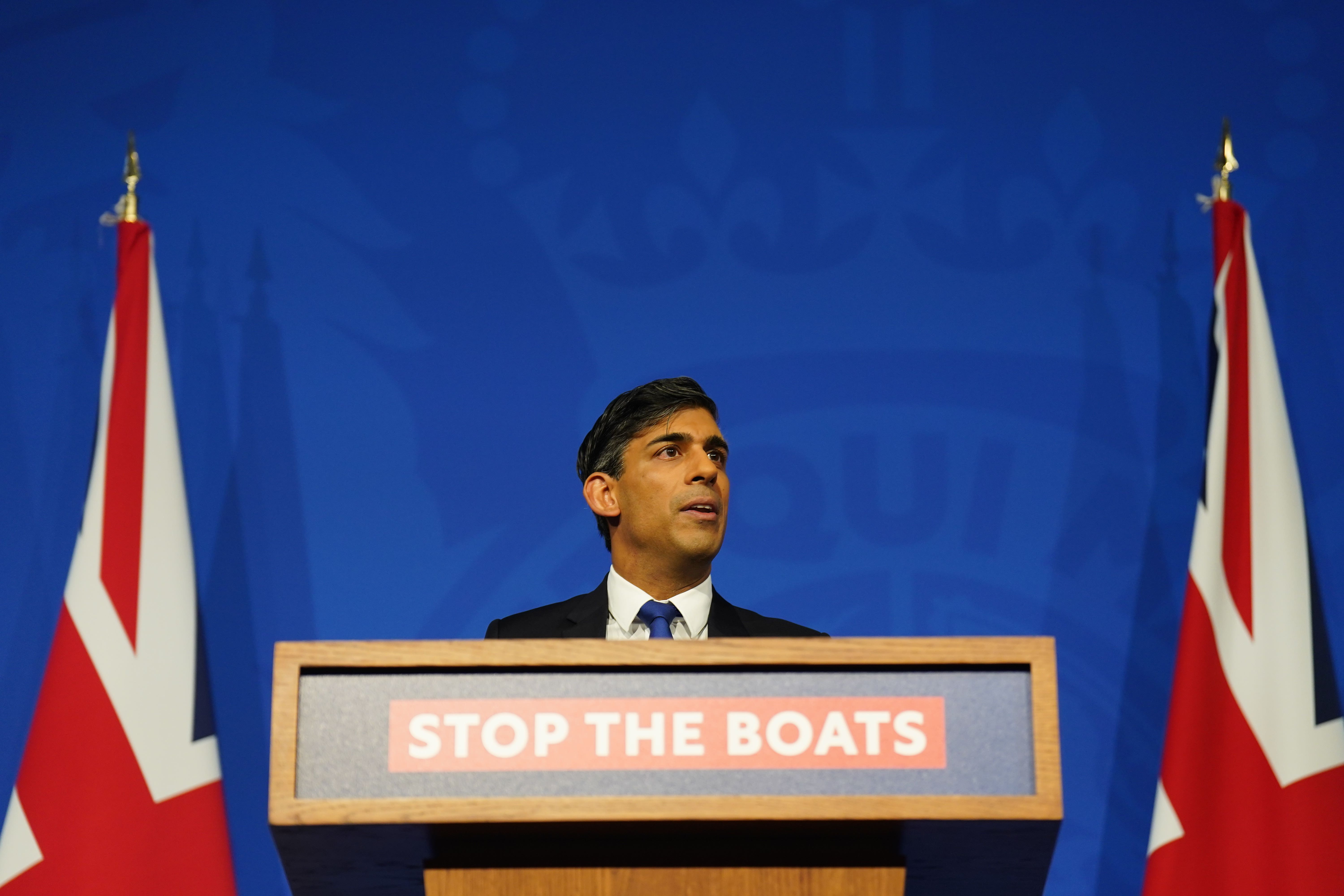Why Rishi Sunak’s rare good week won’t save him
With his plans to raise defence spending and put an end to Britain's 'sick-note culture' – coupled with the embattled Rwanda scheme finally becoming law – the PM has drawn genuine dividing lines with Labour. Some wavering Tory supporters may be won over, says Andrew Grice, but the general election is still as good as lost


Rishi Sunak has finally achieved one of his goals – to make this year’s general election “a real choice”.
Until now, Labour has been adept at man-for-man marking the Conservatives on policy, to reassure voters it is safe to support Keir Starmer’s party. Shadow ministers take their titles literally. This has helped Sunak’s right-wing critics make the ludicrous claim he is not a “real Conservative”.
But in the past week, Sunak has drawn genuine dividing lines with Labour by announcing higher defence spending; seeing his Safety of Rwanda Bill become law; and vowing to end the UK’s “sick-note culture”, partly through a controversial squeeze on disability benefits.
All three moves are designed to appeal to 2019 Tory voters who have abandoned the party. Their timing is deliberate, ahead of Thursday’s local elections – and in part explains why ministers didn’t force the Rwanda legislation through before Christmas.
But the prime minister also had another target audience: the right-wing Tory critics threatening to force a vote of confidence in him as party leader if the council results are bad. They probably will be – not least because the Tories did well when the same seats were last fought in 2021, amid Boris Johnson’s “vaccine bounce”.
Sunak’s promise to increase the defence budget to 2.5 per cent of GDP by 2030 was also well timed. It was made as he visited Germany and, without the pledge, the chancellor Olaf Scholz would have upbraided Sunak for not spending more. Germany was on track to overtake the UK as the biggest defence spender in Western Europe. Not now.
Officially, ministers insist the pledge is all about a dangerous “pre-war” world. But it’s equally about the “pre-civil war” state of the Tory party. The absence of extra money for defence in last month’s Budget fuelled the revolt against Sunak and would have been a rallying point for the rebels next week.
The announcement has saddled Labour with a huge dilemma. Starmer’s tough stance on security issues is no fake tan, and the public have noticed. But while he has matched the 2.5 per cent target, unlike Sunak he has not given a timescale, so the Tories are inevitably painting Labour as soft on defence.
Another headache for Starmer is that he wants to show the UK’s allies that he is serious about security matters; this explains why he was initially reluctant to call for a ceasefire in Gaza. Britain’s partners will want him to match the Tory spending pledge, and a greater UK contribution would be even more important if Donald Trump wins the US election.
However, Starmer’s instincts on defence have collided with Labour’s tough fiscal rules. He must now show the fiscal discipline he demands from his shadow cabinet on a question that really matters to him. For now, Labour has shelved a decision on when it would hit the target until a post-election defence review.
Starmer believes there is one rule on spending pledges for Labour and another for the Tories. He told the BBC the media would have torn Labour “to pieces” if it had announced Sunak’s £75bn defence commitment, describing it as “fictitious”, as it is funded by civil service job cuts and switching research spending to defence.
The Labour leader has a point: Sunak’s policy is to have his cake and eat it. He claims the defence boost would not stop the Tories reducing taxes or spending on other public services. But whoever wins the election will have the nightmarish job of dividing up the public spending cake.
The PM’s three dividing lines might win back some wavering Tory supporters – but not enough to transform his party’s dire election prospects. Voters don’t think the Rwanda policy will deter migrants from crossing the Channel.
One in three 2019 Tory voters will consider the Rwanda plan successful only if Channel crossings stop entirely – and among the wider public the figure is one in four, according to More in Common. This underlines Sunak’s mistake in promising to “stop the boats”. They are not going to stop entirely.
Defence is well down the public’s list of priorities, and Sunak might struggle to convince them it is more important than other services. Crucially, Labour is ahead on the issues which matter most to people – the cost of living and NHS. People are split on welfare reform.
Nor do Sunak’s three policy moves guarantee he will avoid a final attempt to oust him before the general election, following the local polls. If the high-profile Tory mayors Andy Street and Ben Houchen are defeated in the West Midlands and Tees Valley respectively, and the Tories lose the Blackpool South by-election, Sunak’s enemies within might muster the 52 Tory MPs needed to force a vote of confidence.
Despite Team Sunak’s outward confidence after a rare good week, one cabinet minister admitted to me anxiously: “Anything could happen.”





Join our commenting forum
Join thought-provoking conversations, follow other Independent readers and see their replies
Comments